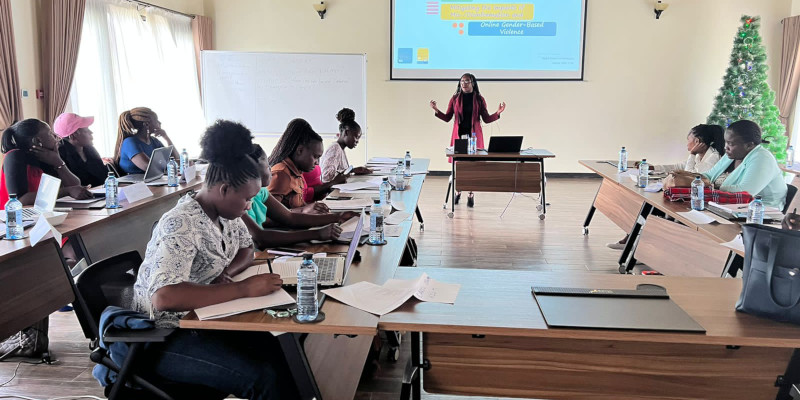Misleading and incorrect information is becoming dangerous, especially in this era of social media. The objective of sending out such information is to deceive and influence people in a targeted direction deliberately. Unfortunately, the most affected are women.
Speaking in Bungoma during the Bungoma and Kakamega Counties female journalists training, Kenya ICT Action Network (KICTANet) CEO & Convenor Grace Githaiga said disinformation is becoming rampant in Kenya with the intention to change the public’s perception towards women as well as to deter women from pursuing careers in politics and leadership positions.
Ms. Githaiga says gendered disinformation in the online space has increased and has amplified violence against women giving examples of how women are bullied on social media platforms.
“Disinformation has undermined human rights and many elements of good quality democracy. It also threatens freedom of thought, association, the right to privacy, and the right to democratic participation,” she explained.
Githaiga who is also a host and Moderator on the Take on Tech program, a Weekly TV Talkshow at Kenya Broadcasting Corporation (KBC) urged journalists to write more stories that depict women as inspiring thinkers and powerful leaders because this will help foster a culture of women and girls empowerment. The media is critical in helping stop retrogressive cultural gender norms and stereotypes.
“The media perpetuates and reinforces gender inequality when it fails to portray women as equals and stereotypes them in their professions, social roles, and personal characteristics,” she added.
Neema Mujesia from KICTANet echoed Githaiga’s sentiments saying the public tends to believe false information as it spreads faster and that there’s a need for the media to curb this through using a Digital Enquirers kit for safer, more credible, and inclusive information and communication.
Mujesia says the kit will help journalists to identify and respond to misinformation, disinformation, and mal-information as well as verify online information.
On the other hand, Racheal Nakitare who is the Assistant Television Programmes Manager, at Kenya Broadcasting Corporation (KBC) says the technology sector is growing steadily and the scant presence of women doesn’t just represent a lost opportunity for them but for society as a whole.
Nakitare who also doubles up as a trainer and Projects Coordinator at The International Association of Women in Radio and Television (IAWRT) Kenya, insists on the need for journalists to amplify women’s voices in the community by giving them visibility through the media.
“Greater diversity at work would provide a global and more accurate view of the major challenges our society faces. If women are left out, not only will the gender gap and inequality continue to grow but it will also be harder for us to address and overcome issues related to equality and economic and social problems. As journalists we must put in more effort by focusing on and publishing women-related stories,” said Nakitare.
IAWRT Kenya carried out the training for women journalists In Bungoma and Kakamega counties with support from the Association of Progressive Communications (APC). It aims to enhance the skills of women journalists in the uptake and use of technology in their day-to-day journalistic work.
By Brenda Imai

